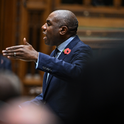Medicine and gardening have much in common, and the parallels in the accumulation and use of knowledge can be illuminating. Years of listening to Gardeners' Question Time have left me humbled at the breadth of the learning of some gardeners. I will never know how many species of plant are native to this country, but the panellists know them all.
They know what kind of soil each plant prefers, how much light, what temperature, when it should be bedded out, when fertilised, if and by how much it needs pruning and what insects victimise it. And they seem to have had direct experience of all but a few of the shrubs, saplings and seedlings on which they pontificate. It is always, "I find that such and such a mulch makes ideal conditions for growing azaleas," or "My Lysimachia nummularia does best under damp and shady conditions"-the personal pronoun reminding us that this is horse's mouth advice.
I used to take it all at face value. I was impressed that anyone could know so much. But then I began to have doubts. How accurate are these tips? How many times has this or that smidgen of advice been tested empirically? Given the number of plant varieties, and the countless possible combinations of water, sunlight, nutrients and Lord-knows-what-else capable of influencing growth, any one person's experience must be limited. The sum total of horticultural knowledge may well be vast, but it is neither well organised, nor readily available. The more you think about the hints of the gardening experts, the more you wonder how much they are bluffing.
In the end, though, if your weeping willow does not so much weep as sob, if your climbing hydrangeas fall to their death, if your dwarf winter irises are less dwarf than stunted-well, after all, they are only plants.
When it comes to medical knowledge, the doctors' problems leave gardeners in the shade. Medical facts may be more systematically organised and stored than gardening wisdom, but they are also available in overwhelming quantity. And if faulty advice does lead to failed treatment, "They're only patients," is poor mitigation in a General Medical Council disciplinary hearing.
By and large, doctors have responded to burgeoning medical know-how in two ways. One is, in principle, sensible: dividing the territory into specialisms and sub-specialisms in the hope of restricting each to an arena within which it really is possible for one individual, unaided, to know more or less all there is to be known. In practice, though, this ploy can land you with doctors whose focus is unhealthily narrow-unhealthy, that is, for the patients. And, in any case, the rate at which medical knowledge accumulates now outpaces all but the most subdivided of super-specialists.
The other response is not sensible, but widely adopted: ignore the problem. Whether or not doctors themselves believe the fiction of their omniscience, they do little to disabuse customers-most of whom, after all, are seeking reassurance not uncertainty. When physicians clearly are out of their depth or just plain wrong, the fault is often seen as the inadequacy of the individual doctor rather than the absurdity of what is expected of him or her.
Given this state of affairs, it is encouraging that the British Medical Journal recently granted space to an American computer expert to argue why it is time for medicine to get to grips with information technology. In a caustic but closely reasoned review of what he calls "voltage drops along the transmission line of medical knowledge," Lawrence Weed argues that doctors only ever attempt to learn a portion of what is available to be learned; that much of what they do learn is soon forgotten; that much of what is retained becomes obsolete; and that much of what is retained and not obsolete cannot easily be matched to any one patient's unique set of characteristics to yield the most appropriate diagnosis or treatment. From the perspective of the patient this recitation is, to say the least, dispiriting.
Small wonder that doctors usually fall back on the global assessment known as "clinical judgement." You do not have to be too cynical to realise that this can be a euphemism for intuition, prejudice, fashion, or the view of the last colleague you spoke to-or any of a stack of other likely influences.
Hopeless, then? Not at all, according to Weed-who has been arguing his case for years, and now runs his own medical software company. The remedy, he says, lies in "knowledge coupling": information systems which store data about all possible diagnoses and treatments; which can be fed the details of any particular patient; and-most important-which can match the two, and suggest the best management. It may sound a bit fanciful, but systems of this kind do exist and apparently work. What's holding them back is the reluctance of so many doctors to accept that there is a problem to be tackled and, inevitably, the initial cost of putting the technology in place.
Weed himself envisages a time when patients might use knowledge coupling systems to make their own health care decisions-though this is apt to arouse nervousness even among those doctors who sympathise with him.











